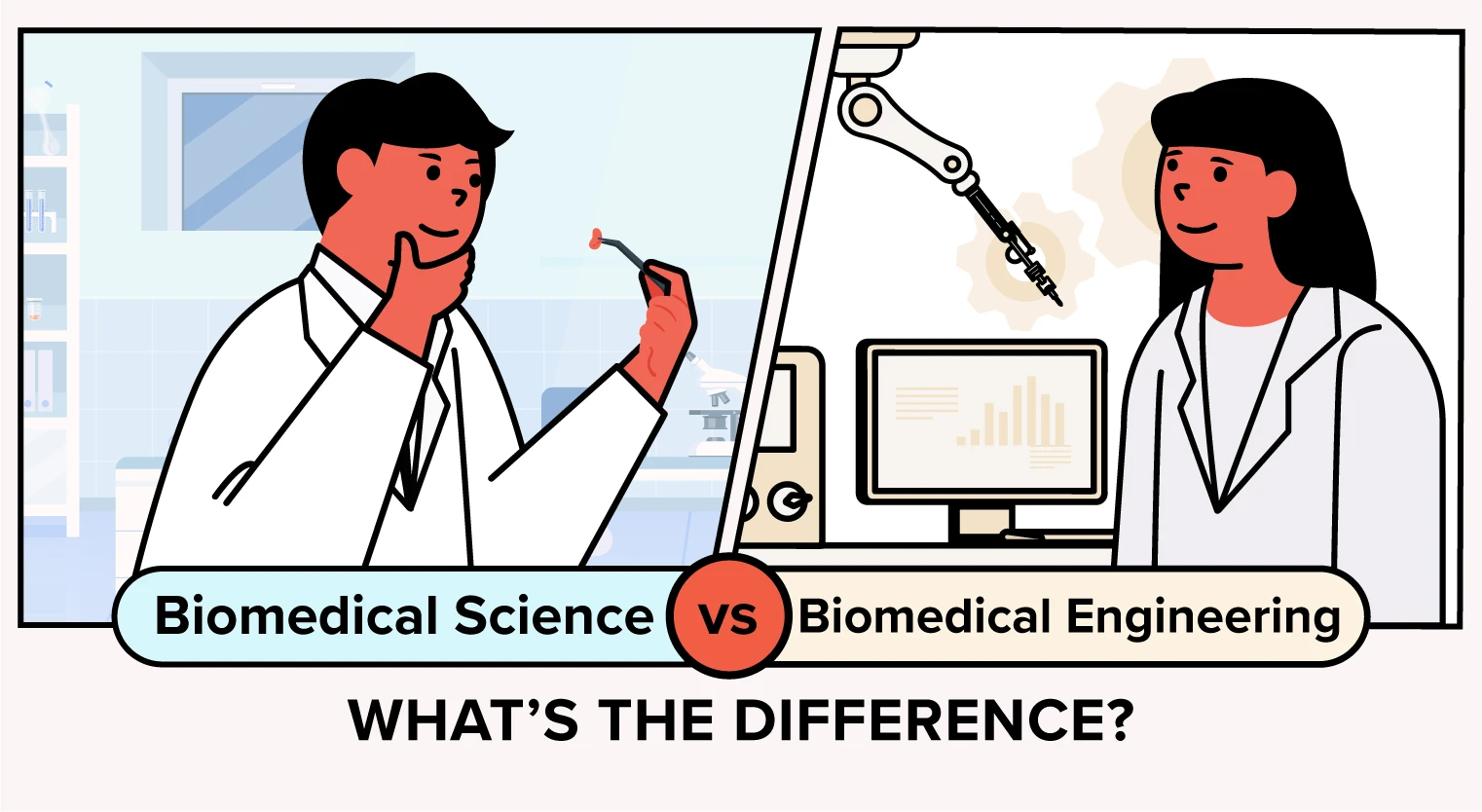Optometrist vs Ophthalmologist: What's The Difference?
Both optometrist and ophthalmologist are eye care providers but they are not the same thing. Here’s how these two professionals differ.
Updated 11 Feb 2023
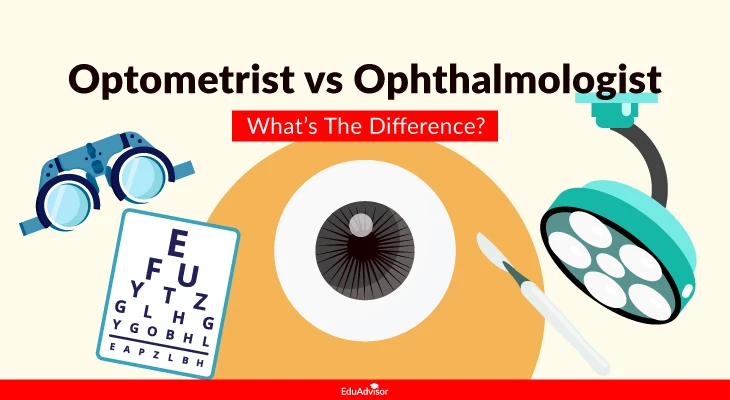
Did you know that only optometrists and ophthalmologists are qualified to give you vision diagnosis and prescriptions for glasses and contact lenses? If that’s the case, surely it doesn’t matter which professional you go to. And if you’re thinking about pursuing a field in vision care, either of these careers should suffice, right?
Well, not quite. An optometrist and an ophthalmologist are both healthcare professionals who specialise in the care of the eyes, but they have different levels of education, training and responsibilities!
From job scope to education background, here’s what you need to know about these two professions.
#1. Optometrist examines and diagnose your eyes whereas an ophthalmologist performs surgical procedures for eye conditions
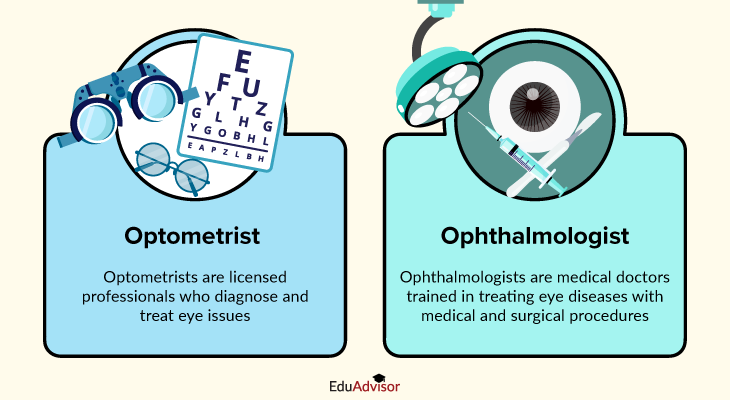
Both optometrists and ophthalmologists are eye care providers but the depth of their expertise differs.
Optometrists are licensed vision care professionals who are trained to examine, diagnose and treat your eyes. While they aren’t medical doctors, optometrists are qualified to perform comprehensive routine eye exams and vision checks, diagnose conditions, and prescribe topical medications (e.g. ointment, eyedrops) to treat minor injuries and infections such as stye and pink eye. They also provide eyewear prescriptions to treat conditions such as astigmatism, farsightedness and nearsightedness.
Optometrists, however, are not medically trained to perform surgical procedures to treat complex eye diseases. Any complex vision issues will be referred to an ophthalmologist.
Ophthalmologists, on the other hand, are medical doctors who specialise in ophthalmology and are specially trained in performing medical and surgical procedures to treat varying eye diseases. This includes complex cases such as cataracts, glaucoma, diabetic retinopathy, lazy eyes, and other diseases. On top of that, they’re also qualified to provide a general vision check-up, diagnose conditions and provide medication similar to an optometrist.
#2. Optometrist requires an optometry degree while ophthalmologist requires a medical degree and postgraduate qualification
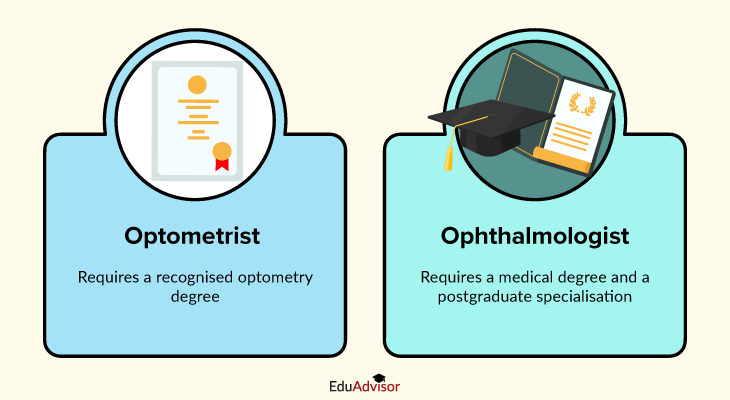
One of the major differences between these two professions is their educational qualifications.
To become an optometrist, you’ll need to have studied a recognised 4-year optometry degree. This is where you will gain comprehensive knowledge and skills about vision health, how to identify eye conditions as well as treat different injuries.
However, to be an ophthalmologist, you’ll need to obtain a recognised medical degree. That’s because an ophthalmologist's care extends beyond vision. They need to understand the overall physiological aspects of the human body and how systemic diseases can affect vision and vice versa. A medical degree will equip you with comprehensive knowledge and surgical skills needed to identify symptoms, complications, risk factors and treatments.
Thereafter, you’ll need to take up a postgraduate study specialising in ophthalmology where you’ll get advanced training in treating various types of vision problems. In addition, you’ll also be exposed to the different subspecialism of ocular sciences such as medical and surgical retina, paediatric ophthalmology and neuro-ophthalmology.
Pro Tip:
You cannot be an ophthalmologist with an Optometry degree. You will still need a medical degree with a postgraduate specialisation in Ophthalmology.

#3. Both programmes cover different subject materials
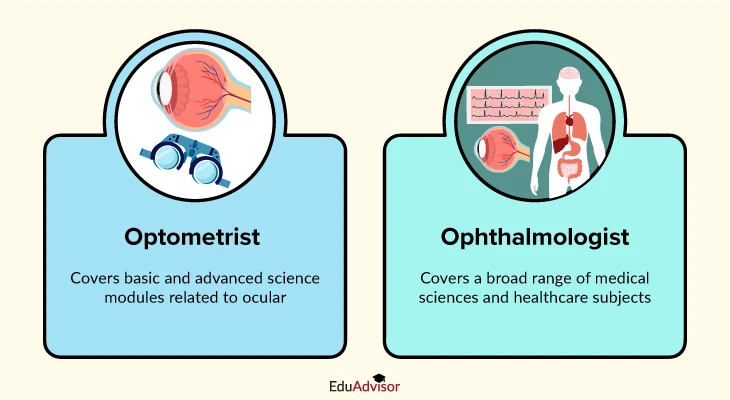
Because optometry and ophthalmology require studying two different degrees, the subjects you cover will ultimately be different too.
In an optometry degree, you’ll typically cover basic and advanced science modules related to the ocular (i.e. eyes or vision). This includes human biology, ocular anatomy, visual science, ophthalmic dispensing, contact lens practice and ocular disease. You’ll also delve into hands-on work where you will learn how to use equipment such as slit lamp biomicroscopes, ophthalmoscopes, corneal topographers and phoropters, and practise taking measurements and performing tests to assess a patient’s vision and eye health.
Meanwhile, a medical degree will have you covering a broad range of medical sciences and healthcare subjects including anatomy, physiology, pathology and pharmacology. The objective of a medical degree is to prepare you to become a doctor to diagnose a wide range of medical conditions and provide medical treatment.
After a medical degree, a postgraduate qualification in ophthalmology is where you’ll gain deeper specialist knowledge in ophthalmology and be able to perform surgical procedures such as cataract and glaucoma surgeries.
Apply for university with EduAdvisor
Secure scholarships and more when you apply to any of our 100+ partner universities.
Start now#4. The time taken to become an optometrist is shorter compared to an ophthalmologist
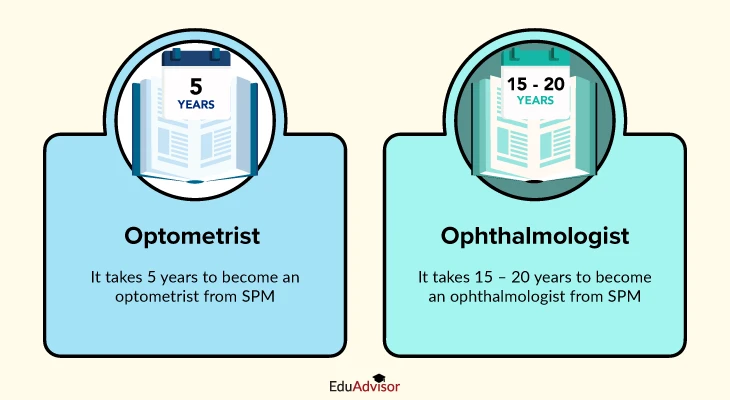
Becoming an optometrist takes less time compared to becoming an ophthalmologist.
To become a licensed optometrist, it will generally take you about 5 years after SPM or IGCSE. After completing secondary school, you will first need to take a foundation programme (1 year) followed by a recognised optometry degree (4 years). Upon graduation, you will need to register with the Malaysian Optical Council (MOC) which will allow you to become a licensed and practising optometrist.
Do note that it is recommended that you obtain a recognised optometry degree with a duration of 4 years. Otherwise, you will be required to undergo a clinical attachment for 1 year and take a Professional Qualifying Assessment (PQA).
Meanwhile, it would take you about 15 – 20 years from SPM to become an ophthalmologist. Firstly, you’ll need to become a registered medical officer. This means studying a 1-year foundation and a 5-year medical degree, completing 2 years of housemanship and another 1 – 2 years of compulsory services after registration. Thereafter, you’ll need to further a postgraduate qualification in ophthalmology which typically takes 4 – 7 years to complete, followed by a minimum of 2 years of supervised training.
Pro Tip:
It’s important that you check whether the optometry degree you choose is a recognised 4-year programme! Learn more about the course and check out which institutions offer optometry here.

#5. Both professions work in different environments and settings
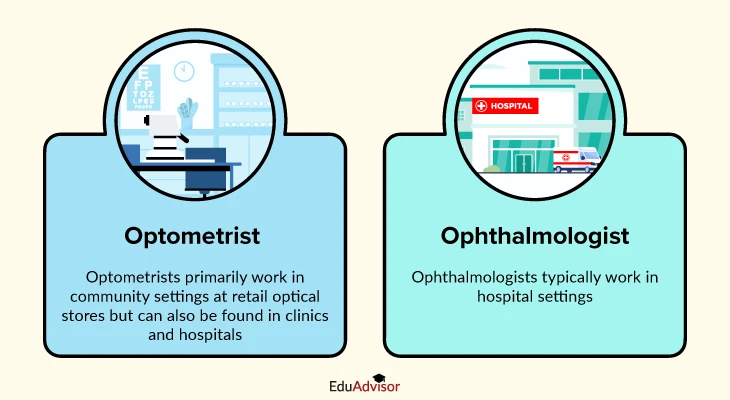
Both optometrists and ophthalmologists work closely in the healthcare field but where they perform their jobs may slightly differ.
Optometrists can be found working anywhere from private clinics and hospitals to retail optical settings as consultants. Most optometrists, however, work in community practice at retail optical stores. They would usually have their personal space set up with relevant equipment to perform vision checks and run tests on patients and customers. Some optometrists would also venture into research and academia.
Ophthalmologists, on the other hand, typically work in hospital settings. They are often at the ophthalmology specialist department where they take on referrals or complex cases. When they’re not diagnosing patients and performing vision checks, they would be in operating rooms performing surgeries. Some ophthalmologists would work in academia settings or as consultants where they would teach, speak in front of groups or travel.
We hope this article has clarified your confusion between these two careers! Knowing the differences between an optometrist and an ophthalmologist is important if you’re planning to pursue a career in the vision healthcare field as both fields call for different qualifications and training.





